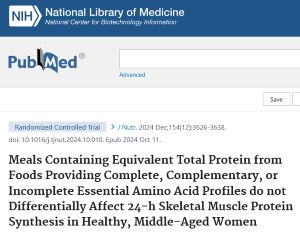New Study Examines Adequacy of Plant-based Protein
by Reed Mangels, PhD, RD
I was speaking at a webinar for registered dietitians and paused for questions. The first questioner asked about amino acid adequacy in vegan diets. Amino acids are described as the building blocks of protein. When our bodies digest protein, the protein from the foods that were eaten are broken down into amino acids which are then utilized by our bodies to make new proteins. When protein is being made, it’s important that the specific amino acids needed to make that protein are available. Some plant foods are higher in some amino acids and some are higher in others.
There’s always been curiosity about where vegans get protein, due at least in part to the idea that “people get protein from meat.” These days, more people are aware that meat is not the only source of protein and that beans, grains, nuts and seeds, soy products, and vegetables supply protein. We still see concerns expressed about the quality of protein from plant sources. This concern, about the amino acid make-up of plant proteins has its roots more than 50 years ago.
In 1971 Frances Moore Lappé published Diet for a Small Planet. This landmark book highlighted the environmental effects of meat production and encouraged people to become vegetarian for the health of the planet. The book included a lengthy discussion of protein combining – eating different plant foods at the same meal so that, overall, the meal’s amino acid content will be similar to that of animal-derived protein. This idea caught the public’s interest and still appears in some nutrition textbooks despite the efforts of nutrition experts to clarify that it’s necessary to eat a variety of plant foods over the course of a day. Protein combining at individual meals is not necessary.
A new study (1) adds support to the idea that protein combining at individual meals is not necessary. This study assessed dietary protein quality by measuring muscle protein synthesis. In other words, the researchers examined whether muscle production would be affected by the amino acid make-up of the meals eaten in a day. The researchers studied 9 middle-aged women who were given 3 meals over the course of a day with each meal containing 23 grams of protein, a moderate amount of protein. The women were randomly assigned to eat meals which provided protein primarily from lean beef for all 3 meals, or from a combination of protein sources (beans and whole wheat bread) at each meal, or from a single protein source at each meal (either black beans or whole wheat bread). The beans and whole wheat bread together supplied a good amount of the essential amino acids with the amino acids in one food complementing the amino acids in the other so that if one food was low in an amino acid, the other food was high in that amino acid. The beans or whole wheat bread alone were low in one or more essential amino acids. The women’s muscle protein synthesis was measured after breakfast and after 24 hours.
Muscle protein synthesis was not significantly different between the three groups. These results support the idea that it is not necessary to eat specific combinations of amino acids at each meal in order to promote protein synthesis. Eating a plant-based diet containing a variety of sources of protein over the course of the day is an effective way to promote muscle protein production. In other words, choosing adequate amounts of different plant protein sources such as grains, beans, nuts and seeds, soy products, and vegetables over each day makes it likely that amino acid needs will be met without having to be concerned with combining or complementing protein sources.
I told the registered dietitian who asked about amino acid adequacy in vegan diets much of what I just wrote – it’s not something to be concerned about in a vegan choosing a variety of plant proteins over the course of a day.
Reference
- Arentson-Lantz EJ, Von Ruff Z, Connolly G, et al. Meals containing equivalent total protein from foods providing complete, complementary, or incomplete essential amino acid profiles do not differentially affect 24-h skeletal muscle protein synthesis in healthy, middle-aged women. J Nutr. 2024;154:3626-3638.
To read more about protein in the vegan diet see:
Protein for Vegans & Vegetarians
How Can I Make Sure I’m Getting Enough Protein?
The contents of this website and our other publications, including Vegetarian Journal and Vegan Journal, are not intended to provide personal medical advice. Medical advice should be obtained from a qualified health professional. We often depend on product and ingredient information from company statements. It is impossible to be 100% sure about a statement, info can change, people have different views, and mistakes can be made. Please use your best judgment about whether a product is suitable for you. To be sure, do further research or confirmation on your own.

